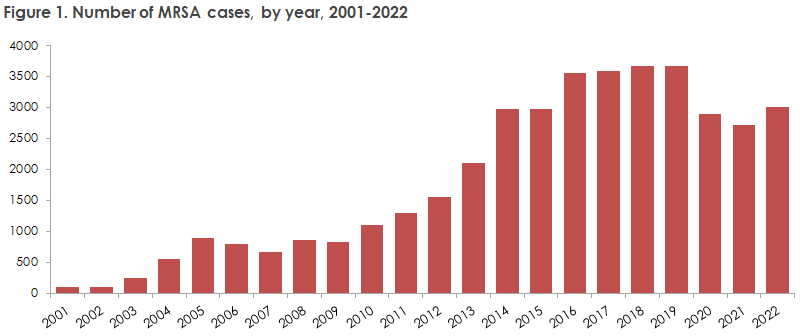No 34a - 2023
Methicillin-resistant Staphylococcus aureus (MRSA) 2022
Methicillin-resistant Staphylococcus aureus (MRSA) 2022
Year 2022 recorded a total of 2,996 new MRSA cases, Figure 1, which was a 10% increase compared with 2021 (2,714), EPI-NEWS 42-43/2022. The lifting of the COVID-19-induced travel restrictions and the ensuing limitations on social contacts and reduced number of healthcare contacts may explain this increase.
For a detailed epidemiological description of the 2022 incidence, please see the 2022 annual MRSA report.

In 2022, a total of 38 outbreaks were registered at hospitals, nursing homes and other institutions, comprising a total of 143 MRSA cases. Six of the outbreaks occurred in neonatal departments, comprising a total of 46 cases. Additionally, seven outbreaks occurred at other hospital departments (a total of 17 patients), and 16 outbreaks were recorded in nursing homes or associated with home care services (44 cases).
The number of cases of livestock MRSA CC398 declined by 13% (N=828) in 2022 and comprised 28% of the total number of cases, which is lower than in the preceding years. Year 2022 saw 92 persons with no livestock contact who became infected with livestock MRSA CC398. This is in line with the preceding years (101 persons in 2021 and 95 in 2020), and the spreading of livestock MRSA CC398 in the general population thereby does not seem to be increasing.
In 2022, a total of 50 cases of Staphylococcus aureus bacteraemias were recorded, corresponding to 1.9% of all cases.
In 423 (14%) cases, MRSA had been acquired abroad, which corresponds to the share (15-20%) recorded in the years before COVID-19 and the ensuing travel restrictions.
Furthermore, an increase was seen in community-acquired MRSA compared with 2021, which may also be explained by reference to COVID-19 restrictions on personal contact.
(A. Petersen, A.R. Larsen, Bacteria, Fungi and Parasites, B. Kristensen, T. Urth, Department of Infectious Disease Epidemiology and Prevention)
23 August 2023